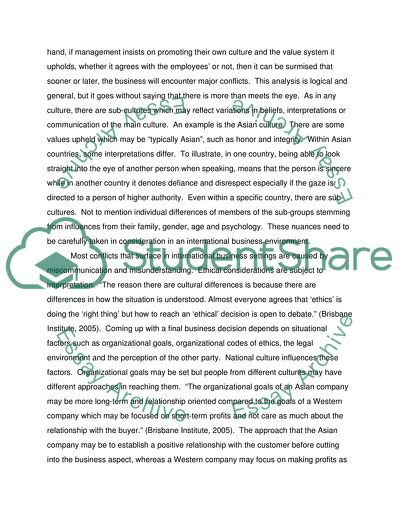
- Home
- Free Samples
- Premium Essays
- Editing Services
- Extra Tools
- Essay Writing Help
- About Us
- Studentshare
- Subjects
- Miscellaneous
- Discuss the importance of national culture in an international business and illustrate its impact on conflict in international business communication
Discuss the importance of national culture in an international business and illustrate its impact on conflict in international business communication - Essay Example

- Subject: Miscellaneous
- Type: Essay
- Level: Masters
- Pages: 4 (1000 words)
- Downloads: 0
- Author: felicity70
Extract of sample "Discuss the importance of national culture in an international business and illustrate its impact on conflict in international business communication"
Needless to say, a business’ primary goal is to make a profit, and a market study is a prerequisite. In an international business where people from different countries inevitably get together for different purposes, studies should include inter-cultural practices and communication styles. Long after the feasibility study has been accepted and approved, giving the business a go-signal to commence, conflicts within the human resources of the international business environment are still bound to arise.
Effective business managers understand the importance of national culture of the country where the business is established. Much of the success of the business would depend on this culture. Culture is defined as “the collective programming of the mind which distinguished the members of one human group from another… Culture, in this sense, includes systems of values; and values are among the building blocks of culture” (Hofstede, 1994). From this definition, one can perceive how much influence culture has on a business, especially in an international one.
This is markedly felt in an environment where management is mostly composed of foreigners and employees are mostly the natives of the country where the business is located. The “collective” thinking, feelings and behavior of the employees, as inculcated in their cultural value system have the power to make or break the business. If the management is considerate and understanding of the national culture, and makes the necessary adjustments to accommodate the needs of the employees, then they can earn the cooperation of their employees, resulting in the success of the business.
On the other hand, if management insists on promoting their own culture and the value system it upholds, whether it agrees with the employees’ or not, then it can be surmised that sooner or later, the business will encounter major conflicts. This analysis is logical and general, but it goes without saying
...Download file to see next pages Read MoreCHECK THESE SAMPLES OF Discuss the importance of national culture in an international business and illustrate its impact on conflict in international business communication
Annotated Bibliography
International Business Environment in Terms of Globalisation
International Organization Behaviour
Culture Shock and Acculturation
Answer exam questionA
The Importance of International Culture in Business
Duke Energy International
Contemporary Business Communication In A Globalised World

- TERMS & CONDITIONS
- PRIVACY POLICY
- COOKIES POLICY